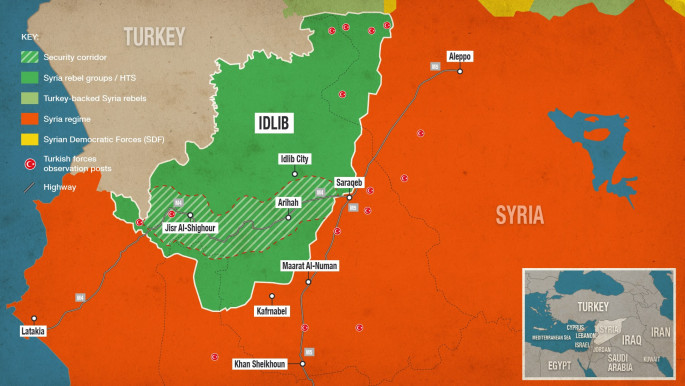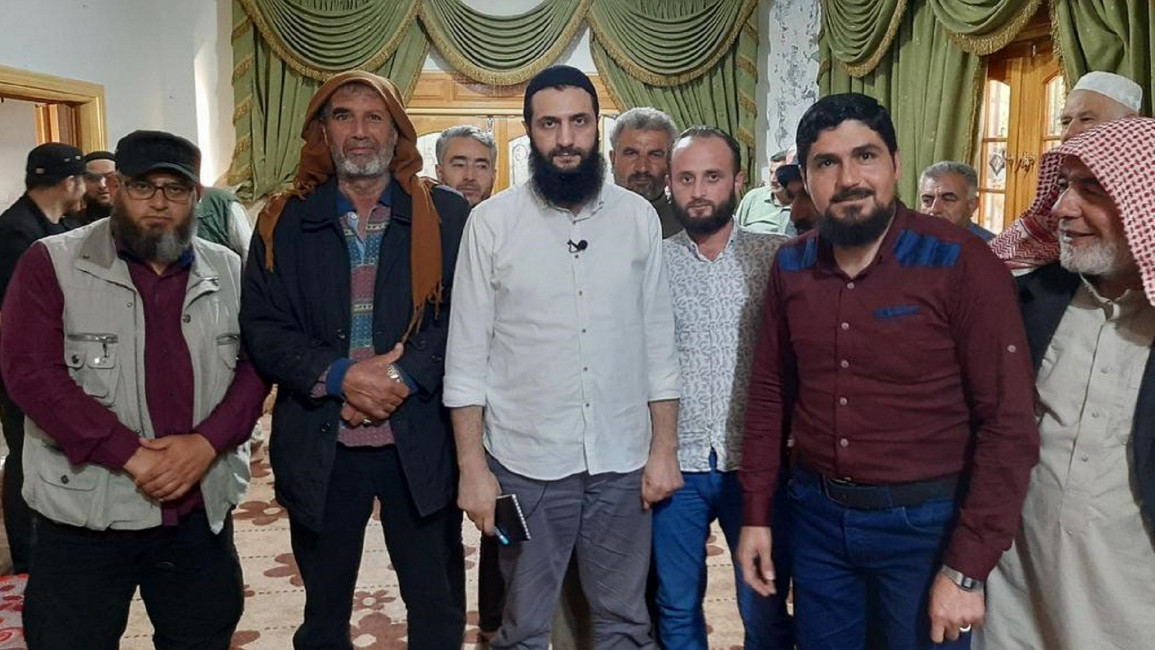Jihadist HTS, former Al-Qaeda affiliate, seeks 'moderate rebrand' to secure seat in Syria's political process
Syrian Islamist group Hayaat Tahrir Al-Sham (HTS), which dominates rebel-held Idlib province, is conducting a public relations campaign in a bit to win support among the opposition region's long-suffering population.
Abu Mohammed Al-Jolani, the previously secretive leader of HTS - a successor to the Al-Qaeda linked Al-Nusra Front - has recently toured Idlib province, attending social events, and meeting tribal and religious leaders.
HTS was formed in 2017 as a result of a merger between the Al-Nusra Front and a number of other Islamist groups.
It says that it no longer has any connection with Al-Qaeda but is still classified as a terrorist organisation by the US, the UK, and Turkey.
Al-Jolani reveals his true identity
During the meetings he attended, Al-Jolani revealed that his real name is Ahmed Al-Sharaa, and that his father, Hussein Ali Al-Sharaa, was an economist from the town of Fiq in the Golan Heights area of southwestern Syria.
His family had to flee the Golan Heights for Damascus after the area was occupied by Israel in 1967.
Al-Jolani also said that although he enrolled at the Faculty of Media at Damascus University, he left Syria for Iraq in 2003 to fight with jihadist factions of the insurgency that emerged after the US invasion of that country.
He added that he was imprisoned by the US for years in the Camp Bucca detention centre in southern Iraq.
The now closed detention centre has previously been described as "the birthplace of the Islamic State group" due to the radicalisation of prisoners kept there caught during counter-insurgency operations.
However, despite both having Islamist extremist beliefs,
HTS and IS have a hostile relationship and fought each other through the Syria war.
According to HTS' Ibaa news agency, Al-Jolani has appeared in the media at least eight times recently.
Each time, he made sure to be seen with civilians, hospital patients, or tribal notables, without any weapons or armed people appearing in the background.
An anonymous source who follows HTS' affairs told The New Arab’s Arabic-language service that "the meetings included discussions about matters affecting liberated northern Syria, including poor living standards, the spread of unemployment, and the fate of detainees in the regime’s prisons as well as the general situation".
Trying to replace unpopularity with legitimacy
A recent military campaign by Bashar al-Assad's regime to capture Idlib province - which killed hundreds of civilians and displaced hundreds of thousands more - caused Turkey to intervene in the rebel-held area against Iran-backed government forces.
Thousands of Turkish troops are now present in Idlib province, in the same areas where HTS operate.
HTS controls most of the province, although other, more moderate, rebel groups such as the National Liberation Front are present.
It has set up the "Government of National Salvation" to rule Idlib, which imposes levies and taxes on the population but has been the target of frequent popular demonstrations against the HTS-linked civil administration.
The protesters have called for HTS to be dissolved and has been unpopular among Syrians in Idlib province.
Syrian opponents of the Assad regime generally oppose HTS due to its extreme ideology, frequent violations against Syrian civilians, and imprisonment and killing of civilian activists.
Its presence in Idlib province is seen as an excuse for the regime and Russia to continue to target civilian areas.
On Wednesday, Russia bombed Idlib province for the first time in three months.
In the past, Russian and regime airstrikes have targeted hospitals, homes, and other civilian infrastructure rather than HTS, which is its proclaimed target.
Read more: Idlib civilians demand no Assad, no Jolani
Jolani’s meetings are believed to be an attempt by HTS to seek legitimacy by presenting a moderate face to the world, in order to be included in the political process and ensure its continued presence in Idlib.
The source who follows HTS' affairs told The New Arab’s Arabic-language service that "Jolani is trying to bridge the gap between himself and the Syrian opposition public. I believe that HTS is now in a new phase where it is trying to be part of a solution to a problem".
In contrast to IS, most HTS militants are Syrians and cannot be expelled from Syria to other countries.
A new non-jihadist phase?
HTS has recently sidelined the hardline non-Syrian clerics associated with it, such as the Saudi Abdullah Al-Muhaysini.
One hardline cleric, Jamal Zeiniyah, known as Abu Malek Al-Telli, has also recently left the group.
In 2019, extremist Egyptian cleric Abu Al-Yaqzan Al-Masri also departed HTS due to its perceived growing moderation.
Hamza Al-Mustafa, a political researcher, told The New Arab’s Arabic service that "It's possible to read Jolani’s repeated media appearances in two ways.
"In one way, its an attempt to convince the outside world - whether Turkey or other powers - that HTS are gradually distancing themselves from global Salafi-jihadism in favour of a national ideology, implemented on the ground through an integration into the local community," he said.
"Jihadi organisations have been characterised by an elitism which sees local communities as religiously ignorant and in need of a jihadist fighting elite."
The other way to read Jolani’s media appearances, Al-Mustafa says, is as an "attempt to improve relations with local communities after the violations committed by HTS against other armed factions and its killing and imprisonment of activists".
"Recently, it did not adequately participate in the fight against the regime’s offensive in Idlib and has indirectly had dealings with the regime via the opening of crossings to regime territory," Al-Mustafa said.
He added that HTS wanted to forestall any political settlement which could lead to its dissolution or elimination by convincing the outside world, especially Turkey, that it has changed.
The anonymous HTS analyst concluded that “HTS is now an entity which the Turks can now deal with because of the great change in its discourse and because it has accepted the understandings between Ankara and Moscow".
He added that HTS had helped Turkey establish a military presence in Idlib and that Turkey had responded favourably to that.
However, whether HTS can be accepted as a legitimate entity by Syrians and the world remains to be seen.
Despite the fact that it disassociated itself from Al-Qaeda four-years-ago, it has not yet convinced the international community that it is not a jihadist "terrorist" group.

Reporting by Amin Al-Assi, additional reporting and translation by Amr Salahi
Editor's Note: The headline has been modified from an earlier version
Follow us on Facebook, Twitter and Instagram to stay connected



